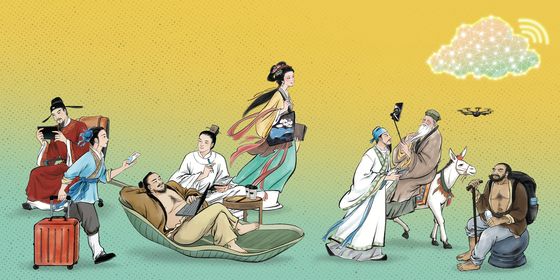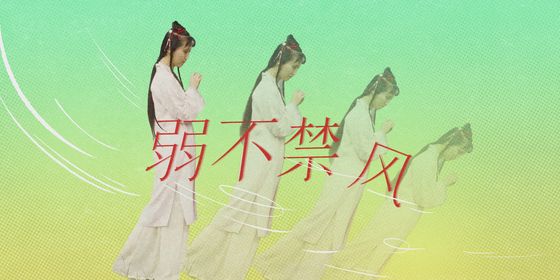Phrases to describe one’s nearest and dearest
Blood is thicker than water: This well-worn chestnut is one of few idioms to take the exact same form in English and Chinese (血浓于水), though it is not clear if the phrases in the two languages are related.
Given the importance Chinese traditionally placed on family lineage, it is not surprising that many four-character idioms (chengyu) exist to describe one’s ties to blood relatives, or 亲戚 (qīnqi). Whether they reward you with “red envelopes” at Chinese New Year, or pepper you with intrusive questions, everyone has relatives, and can appreciate the following phrases:
骨肉至亲 Flesh and blood kin
骨肉, literally “bone and flesh,” is a metaphor for one’s blood relatives that appears in many family-related chengyu. This idiom describes one’s closest relatives, whether by lineage or emotional ties:
骨肉至亲应加强团结。
Gǔròu zhìqīn yīng jiāqiáng túanjié.
Blood relatives should be united.
六亲不认 Disowning one’s closest relatives
The term 六亲, literally “six relations,” appears in many chengyu about family. In the ancient history text Zuo Zhuan (《左传》), 六亲 referred to six types of family relations that were considered to be the most important, namely father and son, brothers, father’s sisters, uncle and nephew, one’s wife’s father, and one’s son-in-law’s father. In the Daoist text Laozi (《老子》), the six relations were father, son, older brother, younger brother, husband, and wife.
Over time, 六亲 became a colloquialism simply meaning “close relatives,” and the idiom 六亲不认 refers to a heartless person who feels no kindness or gratitude toward anyone—not even their nearest and dearest:
钱可以让人六亲不认。
Qián kěyǐ ràng rén liùqīn bú rèn.
Money can cause a person to forget their closest relatives.
三亲六眷 Three kin and six relatives; a multitude of kin
This is another chengyu that comes from ancient methods of categorizing one’s family members. The “three kin” were three categories of kin: one’s relatives one’s father’s side, one’s mother’s side, and one’s wife’s side. The “six relatives,” indicated by the archaic character 眷 (juàn, family dependent) referred to individuals: one’s father, mother, older brother, younger brother, wife, and children (some explanations put one’s parents-in-law in the place of the brothers). As a chengyu, the phrase is a way of referring to a large family or a big group of one’s extended kin:
女儿大学毕业,父母很高兴,三亲六眷奔走相告。
Nǚ’er dàxué bìyè, fùmǔ hěn gàoxìng, sānqīn liùjuàn bēnzǒu xiānggào.
When she graduated from university, her parents were so happy that they shared the news with all the relatives.
沾亲带故 Claims of kinship and friendship
Sometimes, you need to refer to an even bigger group of people than all of your relatives. 故 is an an archaic way of referring to one’s friends, and this chengyu describes an assortment of people who can claim relation or friendship with oneself:
听说他在社会上出人头地,所有沾亲带故的人都纷纷来讨好他。
Tīngshuō tā zài shèhuì shàng chūrén tóudì, suǒyǒu zhānqīn dàigù de rén dōu fēnfēn lái tǎohǎo tā.
After he became a success, everyone who was remotely connected to him came to curry favors.
显亲扬名 Distinguish one’s parents and honor one’s name
In this idiom, the character 亲 refers to one’s closest relatives of all—one’s parents. It describes actions that make parents proud and bring honor to one’s family:
她一心希望考上名牌大学,以至显亲扬名。
Tā yìxīn xīwàng kǎoshang míngpái dàxué, yǐ zhì xiǎnqīn yángmíng.
Her only wish is to get into a good university and make her parents proud.
皇亲国戚 Relative of the emperor and kin of the nation; powerful people
Bringing honor to one’s relations is all well and good, but the truly illustrious families were those who governed a country: in the past, the emperor’s relatives often took high political office, and could even rule the country as regents. 皇亲国戚 is a metaphor for a person who is so powerful, they might as well be related to the emperor himself:
他的改革得罪了公司里所有的“皇亲国戚”。
Tā de gǎigé dézuì le gōngsī lǐ suǒyǒu de “huángqīn guóqī.”
His reforms offended all the big-shots in the company.
情同骨肉 As dear as flesh and blood
Family can come in all shapes and sizes, and a friend can sometimes feel as close as a blood relative—hence this chengyu:
我们几个人是患难之交,情同骨肉。
Wǒmen jǐ gè rén shi huànnàn zhī jiāo, qíng tóng gǔròu.
We have gone through many hardships together, and are as close as family.
Cover image from VCG












